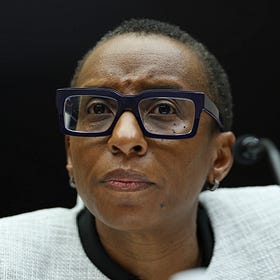Why the Hur report triggers bad 2016 flashbacks
It's like James Comey and "but her emails" all over again.

This free edition of PN is made possible by paid subscribers. If you aren’t one, please click the button below to support our independent journalism.
Last week, Robert Hur, the special counsel charged with investigating whether President Biden mishandled classified documents, dropped a 388-page report concluding that Biden did, but not enough to warrant prosecution. If this feels an awful lot like James Comey’s July 2016 statement about then-candidate Hillary Clinton’s use of a private email server, that’s because it is.
Now, thanks to Hur and the credulous mainstream media, we’re living through a variation of “but her emails,” and it could have similarly disastrous consequences.
Hur’s report has given the media what they crave — a chance to engage in both-sidesism about Biden and Trump, allowing for breathless horse race political coverage rather than a solemn reckoning with the magnitude of the threat of another Trump presidency.
E.J. Dionne, Jr. called out media false equivalencies last month in the Washington Post: “It's time for everyone, the media especially, to face up to the actual choice: Between constitutional democracy and authoritarianism. Between a normal human being and a self-involved, spiteful madman.”
The actual conclusions of the Hur report are relatively dry and don’t lend themselves to excitable headlines. Just Security laid out what is really in the report rather than how it was covered. Hur found no evidence that Biden knew the information he shared with a ghostwriter contained classified information. Hur also found that there was no evidence Biden retained any classified documents willfully or that he willfully disclosed classified information. Hur also found that Biden chose to return documents once he discovered them, and Biden reasonably believed that some documents in his possession, such as his own diaries, were his to retain.
Contrast this to Trump’s behavior regarding classified documents, as laid out in the grand jury’s criminal indictment. Trump bragged, on tape, that the classified “plan of attack” he was showing Mar-a-Lago guests was “highly confidential” and “secret” and admitted he could not declassify it because he was no longer president.
Trump also showed a member of his PAC a classified map relating to a military operation and admitted he should not be showing it to someone with no security clearance. Once Trump was under investigation, he attempted to obstruct the proceedings in several ways, including trying to get his attorney to lie to the grand jury and to hide or destroy documents, asking co-defendant Walt Nauta to hide boxes, and lying to the FBI that he had fully complied.
Biden and Trump’s behavior regarding classified documents are not remotely similar. Still, the fact Hur determined there was not enough evidence to charge Biden is already being spun by Trump as evidence of a double standard. Trump also claimed he was more cooperative with the investigation than Biden had been, an assertion Hur specifically addressed and disposed of: “After being given multiple chances to return classified documents and avoid prosecution, Mr. Trump allegedly did the opposite. [...] In contrast, Mr. Biden turned in classified documents to the National Archives and the Department of Justice, consented to the search of multiple locations including his homes, sat for a voluntary interview, and in other ways cooperated with the investigation.”
A note from Aaron: Working with brilliant contributors like Lisa requires resources. To support our work, hit the subscribe button and become a paid subscriber.
Nonetheless, Hur’s report gave Biden's detractors additional political ammunition. In the early pages of it, Hur weirdly speculated about how Biden would defend himself were Hur to have charged him: “Mr. Biden would likely present himself to a jury, as he did during our interview of him, as a sympathetic, well-meaning, elderly man with a poor memory.” Hur details Biden’s other lapses, including confusing which days his vice presidency terms began, being uncertain as to what year his son Beau died, and appearing “hazy” when describing the Afghanistan conflict.
Why would Hur include this when it has nothing to do with whether Biden willfully retained or disclosed classified documents? Because, says Hur, he expected that, had he charged Biden, Biden’s attorneys “would emphasize these limitations in his recall.” Hur also said he expected jurors would be “struck” by where Biden had stored Afghanistan documents — in a damaged box in the garage near “a collapsed dog crate, a dog bed, a Zappos box, an empty bucket, a broken lamp wrapped with duct tape, potting soil, and synthetic firewood.” It is unclear how Hur thinks that storing documents near other common garage detritus is somehow evidence of a lapse in cognition.
Unsurprisingly, the media honed in on the part of Hur’s report impugning Biden’s cognitive abilities. CNN convened a panel to wonder why age is more of an issue for Biden than Trump. The Wall Street Journal noted Biden’s age was back in the stoplight. WaPo declared the report was a “scathing picture” of Biden’s memory.
But perhaps no mainstream media publication handled this as poorly as the New York Times, which used the report's language to whip up an absolute frenzy over Biden’s cognition, running four separate pieces on the same day, all fretting about Biden’s ability to keep governing.

Then, the Times did its patented pivot: after ginning up a nonexistent panic about Biden’s mental acuity while ignoring similar concerns about Trump, the paper published a piece wondering why “the age issue” was worse for Biden than Trump.
It’s distressingly similar to how the paper covered the plagiarism allegations against then-Harvard President Claudine Gay. The Times ultimately devoted a live blog to her resignation after covering the allegations on the front page every day from December 7-14 and again on December 17, 22, and 25. Only after Gay was forced out did the paper seek to fully examine the role of racism and detail how conservatives have weaponized concerns about diversity, notably omitting the Times’ own role in the feeding frenzy.
Hur’s inclusion of his thoughts about Biden’s cognition was wholly unnecessary to conclude that there was insufficient evidence to show Biden intended to break the laws. Further, speculating about Biden’s possible defenses had Hur brought charges is a gratuitous way to undermine Biden and imply that the president is still at fault, despite Hur’s overall conclusion that he was not.
It’s very similar to James Comey’s statement clearing Hillary Clinton of any wrongdoing for her use of a private email server. The FBI concluded that “no reasonable prosecutor would bring such a case,” but Comey still had to take jabs at Clinton, like calling her “extremely careless” and complaining about the “security culture” of the State Department when she was at the helm.
Comey’s musings led to wall-to-wall news coverage. The Columbia Journalism Review found that the New York Times ran “as many cover stories about Hillary Clinton’s emails as they did about all policy issues combined in the 69 days leading up to the election.” CJR also found that sentences about Hillary’s alleged scandals were four times as frequent as sentences discussing her policies. Conversely, sentences about Trump were far more likely to cover his policies than his scandals.
Now, it’s happening again. Hur has self-interested reasons for taking cheapshots at the president, but his report provided big national outlets with an opportunity to spend days fixating on Biden’s age — and they ran wild with it.

Some of the blame here falls upon those Democrats who are wedded to the belief that having a Republican investigate a Democrat shows that the Democrats are fair-minded and above politics. There’s also a notion that if a Republican exonerates a Democrat, conservatives will see that exoneration as valid. These things are simply not true. There is nothing Democrats can do that the GOP will not spin as nefarious.
Witness the appointment of United States Attorney David Weiss as special counsel to investigate Hunter Biden. A lifelong Republican, Weiss was appointed to his position by Donald Trump, and Biden kept him on. Republican politicians spent 2022 demanding that Weiss, specifically, be named to investigate Hunter. Once Attorney General Merrick Garland did just that, those same Republicans complained that Weiss was named to help “whitewash the Biden family corruption” and that he needed to be replaced.
Like Weiss, Hur is a lifelong Republican, with Trump having named him United States Attorney for the District of Maryland. Hur had returned to private practice before Garland appointed him as a special prosecutor to look into Biden’s retention of documents. But Garland should know by now there’s no appeasing the GOP and there’s no pleasing the press. All he’s doing is giving bad actors ammunition, and this election is going to be bad enough without an unwitting assist from the DOJ.
That’s it for today
If you appreciate this post and aren’t already a subscriber, please support our journalism by signing up. Click the button below. Paid subscribers make PN possible.
We’ll be back with more Wednesday. Until then.




“Hur’s inclusion of his thoughts about Trump’s cognition was wholly unnecessary to conclude that there was insufficient evidence to show Biden intended to break the laws.” Do you mean, Hur’s thoughts about Biden’s cognition?
Very on-point piece. As another commenter mentioned, the one big difference between L'Affaire Hur and the Comey Email Debacle is timing: Comey's final blow hit less than 2 weeks before Election Day 2016, while we're still many months out from Election Day 2024. Biden still has plenty of future opportunities to clearly and publicly rebut the knocks on his cognition, which he can do simply by demonstrating his sharpness while delivering major addresses such as the State of the Union.